ZTC For Faculty
What is Zero Textbook Cost (ZTC)?
ZTC is a broader term that includes Open Educational Resources (OER) and other types of free materials, such as Library resources and Web resources. These resources may not have an open license, and they may be copyrighted with some restrictions on use, but they are still free to students.
California Education Code § 66406.9 requires that ZTC courses are clearly marked in the online schedule of classes.
Examples of ZTC Resources
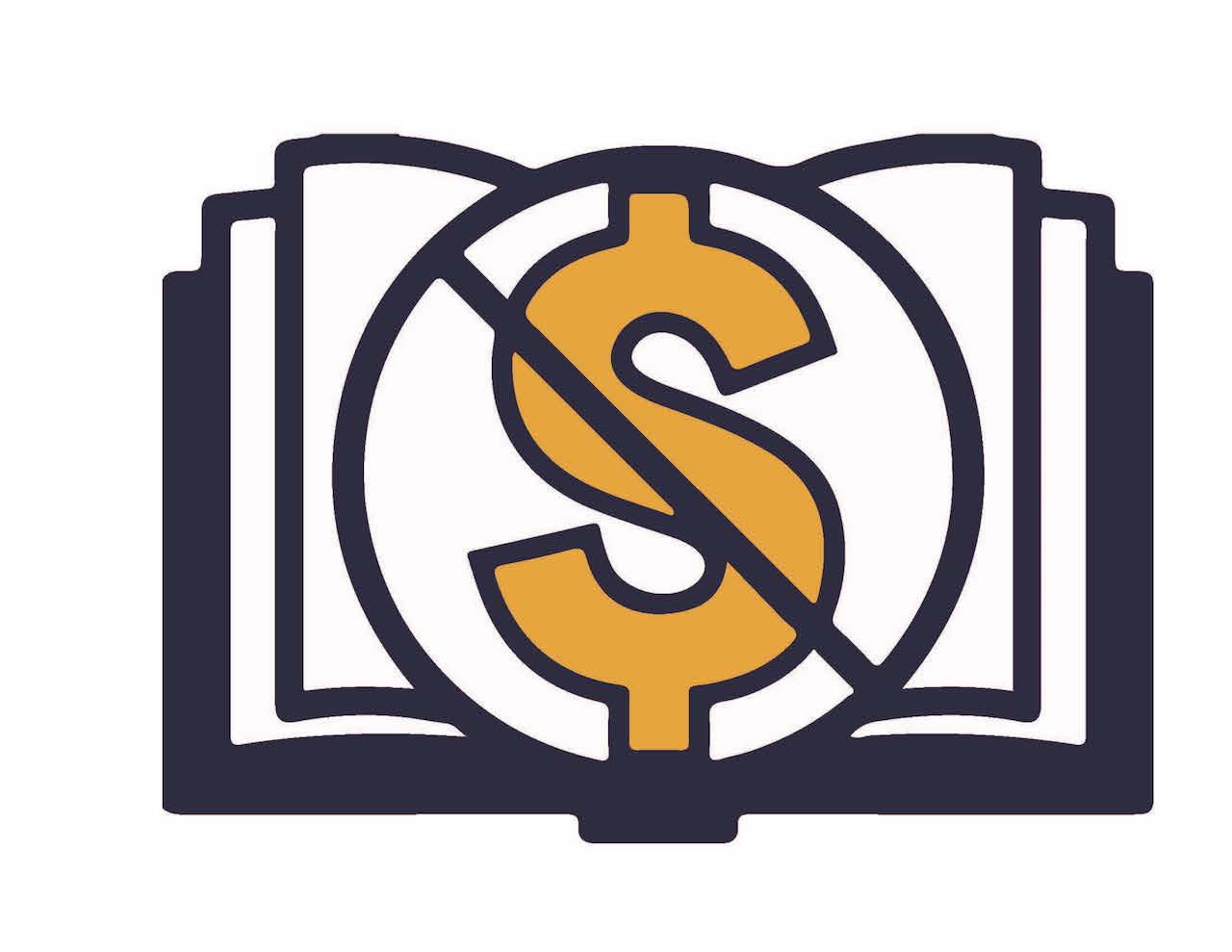 OER
OER- Public domain materials
- Free Web resources
- Instructor-created materials
- Library articles, streaming films, and particularly eBooks that allow for unlimited users and perpetual licensing (contact your Library for assistance)
- Class sets
Note: When considering various resources, keep in mind that the ZTC legislation (§ 78052) prioritizes—to the extent possible—the adaptation of existing OER, long-term sustainability, and the implementation of degrees that other community colleges can use/adapt.
Library Resources Have Value
Although online library resources are not "open," the SWC library should still be considered a valuable source for digital content that can be made
available at no cost to students. Library collections are typically vast, high-quality,
and accessible. They encompass a wide range of material types, including eBooks, journals,
magazines, newspapers, streaming videos, and high-resolution images. Plus, they come
with the assistance of helpful librarians!
In fact, there are situations where using library content might be the best approach,
especially when it's not feasible to use an OER. For instance, when studying modern
poetry, most of your primary sources will likely be under copyright. It's also a reality
that some existing OERs don't align with the learning objectives of certain courses.
In such cases, your campus library can bridge those gaps.
For additional insights on this, watch this 5-minute video from OpenOregon titled "Library Resources as Course Materials."
An Overview of Open Educational Resources (OER)
Open Educational Resources (OER) are freely available learning materials that can be copied, edited, and shared to better serve all students. For educators, this means you can use, reuse, and distribute these materials legally and at no cost, without needing to ask for permission. For students, this translates to accessing selected or created learning materials at no cost.
In some instances, this allows you to download a resource and share it with colleagues and students. In others, you might be able to modify a resource and then repost it as a remixed work. So, how can you discern your options? Typically, OER are openly licensed (for example, through Creative Commons) to clarify how the material can be retained, reused, revised, remixed, and redistributed.
The Open Education movement is anchored in the fundamental human right to access high-quality education. It not only seeks to reduce costs by offering openly licensed content but also strives to broaden opportunities for participation in creating and sharing educational resources.
Please watch this 3:47-minute video for a concise and informative introduction to OER
Additional viewing options: Turn on closed captions with the "CC" button, or use this text transcript if you prefer to read.
Want to Know More?
Dive deeper into OER with our comprehensive LibGuides on Open Educational Resources.
The Difference Between OER and ZTC?
The terms Zero-Textbook-Cost (ZTC) and Open Educational Resources (OER) are often misunderstood or used interchangeably. To clarify, ZTC refers to courses that have replaced required textbooks with OER or other cost-free alternatives, such as appropriately licensed library e-books, ensuring that course materials are free of charge for students. On the other hand, OER are freely accessible, legally compliant educational resources. They encompass a wide range of content, including course materials, textbooks, tests, videos, images, music, and more.
Textbook Affordability & Transparency
The Zero Textbook Cost (ZTC) and Low Textbook Cost (LTC) Guidelines help faculty label courses in the online schedule to show students which options have free or inexpensive textbooks. This promotes price transparency and supports students in making informed registration choices.
Displaying the ZTC Symbol in the Online Class Schedule
To have a ZTC symbol displayed next to your course section in the online class schedule, please follow the steps below:
- Use an Open Educational Resource (OER) for your course.
- Submit a textbook requisition indicating “No textbook required.”
- Include the URL of the OER in the comments field of the textbook requisition.
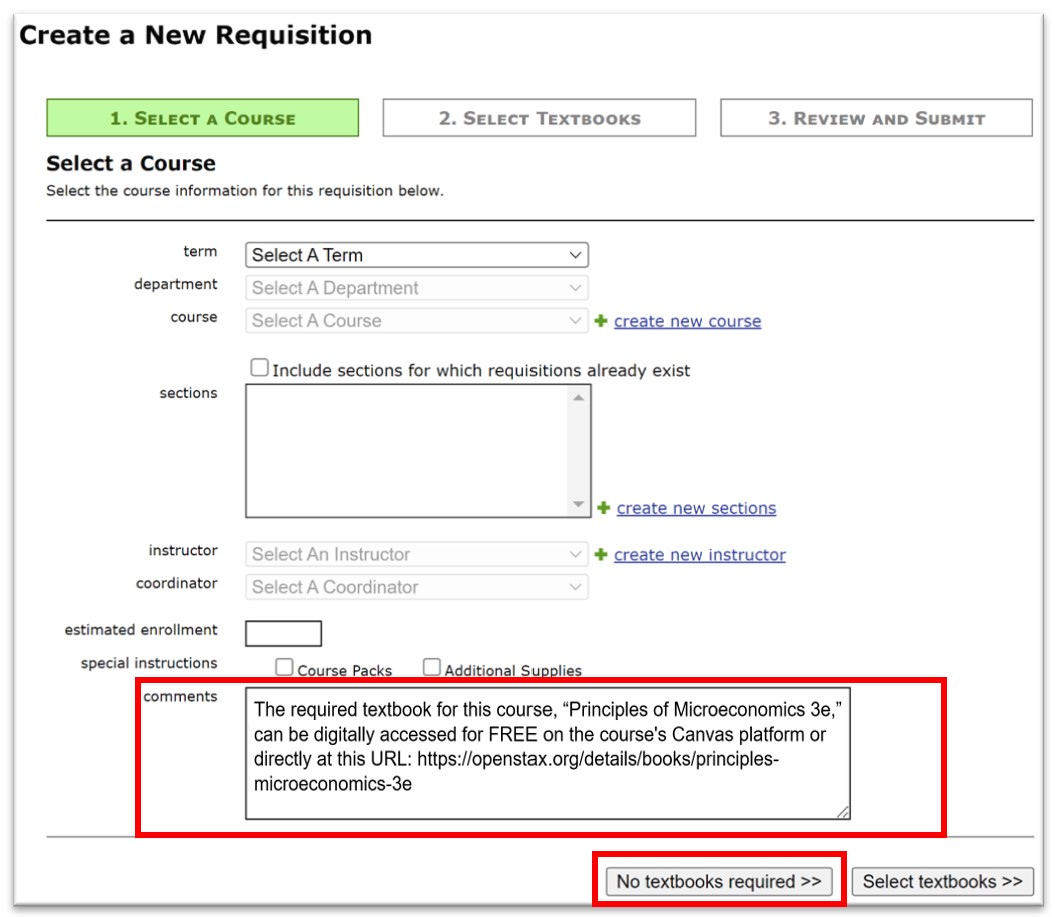
The Benefits of Using OER
"I had to go to sleep hungry because I had to choose between gas for traveling and textbooks and food...and buying my kids shoes…No one should have to make these kinds of choices.”
—Marjorie Blen, Student (California Community Colleges Chancellor's Office, 2021)
Why Do Educators Use OER?
Educational systems operate with a fundamental disconnect between practices from the
analog world, and the vast potential of the digital world to support more affordable,
effective teaching and learning. Open Education seeks to close this gap.
Textbook costs should not be a barrier to education. Data from the Bureau of Labor Statistics (2016) show that the price of college textbooks increased 88% from January 2006 to July 2016. If we take a longer look back — from January 1977 to June 2015 — the increase is even more startling. During this time period, Bureau of Labor Statistics data show a 1,041% increase in college textbook prices, which is over three times the rate of inflation (Popken, 2015). College students face steep price tags that can make the cost of learning higher than the cost of attending a college or university. Using OER solves this problem because the material is free online, affordable in print, and can be saved forever.
Students learn more when they have access to quality materials. The rapidly rising cost of textbooks in higher education has left many students without access to the materials they need to succeed. Studies show that 93% of students who use OER do as well or better than those using traditional materials, since they have easy access to the content starting day one of the course (Hilton et al., n.d.).
Openly licensed materials increase currency and relevancy. Imagine a science textbook that incorporates the latest results from a laboratory, or a math tutorial that incorporates local landmarks into word problems. This and more is possible when instructional materials are created to be shared and improved digitally and legally.
Please watch the following 4-minute video that highlights reasons for using OER.
Additional viewing options: Turn on closed captions with the "CC" button, or use this text transcript if you prefer to read.
Finding OER
Explore popular sources to discover OER for your course:
Open Textbook Collections
Open textbooks have been funded, published, and licensed to be freely used, adapted, and distributed. They can be read online or downloaded at no cost, and they can often be printed at low cost. Below are some examples of high-quality open textbook collections:

- OpenStax (Rice University): Peer-reviewed, openly licensed textbooks and accompanying ancillary materials, such as slides and test banks. OpenStax textbooks have been adopted at 70% of higher ed. institutions, and have saved students nearly $2 billion in
- the past 10 years.
- Open Textbook Library (UMN): A well-curated collection of over 1,000 high-quality open textbooks in many subjects, with faculty reviews.
- Open Educational Resources by Discipline (ASCCC OERI): Lists of open textbooks by discipline, curated by CA community college faculty.
- LibreTexts (UC Davis): Widely-used and well-developed. Browse collections by discipline (click "Explore the Libraries" at the top).
- College of the Canyons OER Textbooks: Highly-relevant collection of free online textbooks written by CCC faculty.
Other OER Repositories & Search Tools
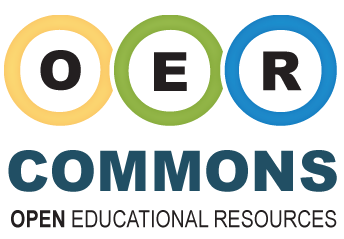
- OER Commons: A large repository, OER Commons is easy to search. The CA Community Colleges Hub may be of particular interest.
- COOL4Ed (California Open Online Library for Education): Search by C-ID or browse the faculty showcase by discipline and/or institution.
- OASIS: This user-friendly tool helps you search for OER from over 100 different sources and contains over 400,000 records. Developed by SUNY Geneseo's Milne Library.
- GALILEO Open Learning Materials (University System of Georgia): High-quality open textbooks and ancillary materials.
- Open Oregon: With an extensive list of resources, Open Oregon offers information about the actual classes using the OER, including the institution, course name, links to materials, and instructor information.
Emerging OER Projects
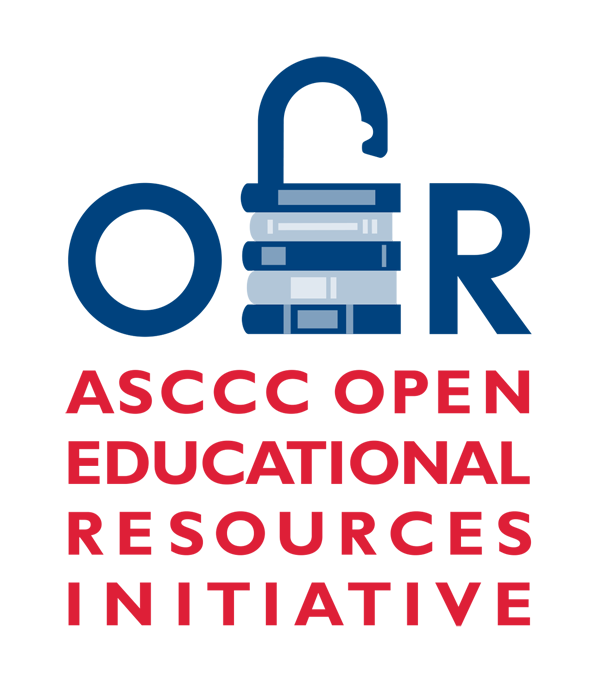
- CC ECHO (CA Consortium for Equitable Change in Hispanic Serving Institutions OER): Scroll down to see completed and in-
- progress textbooks created by CA community college faculty.
- ROTEL (Remixing Open Textbooks through an Equity Lens): Upcoming OER textbooks created or adapted with an equity and inclusion lens.
- Open RN & Next Gen RN: OER resources for Nursing (textbooks, virtual simulations, and NCLEX practice questions).
- ASCCC OERI Funded Resources: Here you can view upcoming OER projects that have been funded but may not be available yet.
Remember the Public Domain
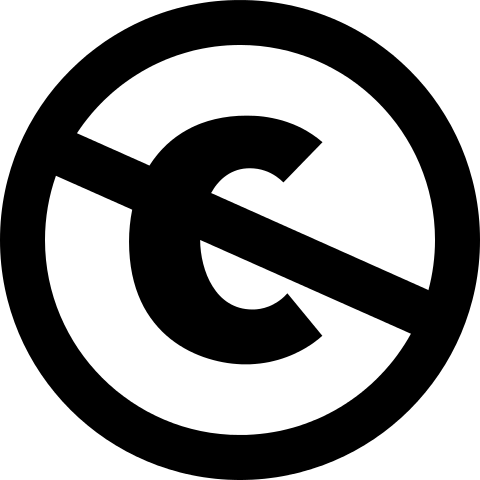 Don't forget about the public domain! This refers to creative works that are not protected
by copyright (for example, works published over 95 years ago). To learn more about
the Public Domain, see this excellent guide from University of Texas Libraries: Public Domain Information. Use the left menu to browse public domain collections of books, images, audio/video,
and government sites.
Don't forget about the public domain! This refers to creative works that are not protected
by copyright (for example, works published over 95 years ago). To learn more about
the Public Domain, see this excellent guide from University of Texas Libraries: Public Domain Information. Use the left menu to browse public domain collections of books, images, audio/video,
and government sites.
Tip: Librarians Can Be Terrific Allies!
![]()
Librarians are often the most knowledgeable sources on campus when it comes to OER, and they might also have curated guides and resources ready for you to use. You may have the option to consult a librarian who can search for OER for you. Librarians can also recommend zero cost alternatives such as e-books, databases, specialized collections, and more.
For more information, please visit our SWC Library page. Additionally, explore our LibGuides on Open Educational Resources for comprehensive details on topics like licensing, starting and using OER, developing and sharing OER, self-paced courses, and more.
ZTC Stipend Program
We have launched several Zero Textbook Cost (ZTC) stipend programs aimed at encouraging faculty to convert their courses to ZTC. Typically, these programs are announced via email by either Mia McClellan, the Dean of Instructional Support Services, or Chris Hayashi, the ZTC Workgroup Chair. Be sure to keep an eye out for these emails so that you can apply for future ZTC stipends.
OER/ZTC Professional Development
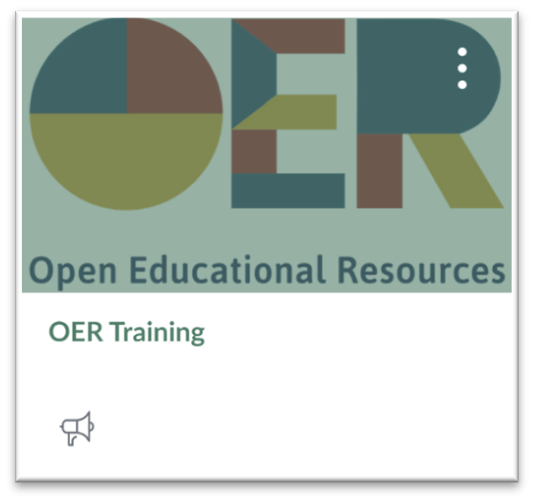 OER Canvas training is available for enrollment or review.
OER Canvas training is available for enrollment or review.
To participate or for more information, please contact Margaret Drehobl at mdrehobl@swccd.edu.
Zero Textbook Cost (ZTC) degree pathways (In-Progress):
Southwestern College is in the process of offering the following Zero Textbook Cost
(ZTC) degree pathways. This ensures that at least one section of both the major and
GE course sequences will be available as ZTC.